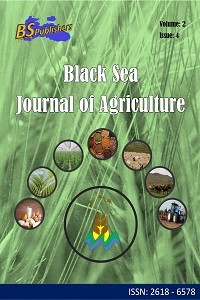Abstract
References
- Al Jassım RAM, Ereifej KI, Shibli RA, Abudabos A. 1998. Utilization of concentrate diets containing acorns (Quercus aegilops and Quercus coccifera) and urea by growing Awassi lambs. Small Rumin Res, 29: 289-293.
- Boubaker AG., Abdouli H., Zaidib I., Tayachi L., Mansouri M., Losada, MRM. 2007. Cork Oak (Quercus suber L.) acorn as a substitute for barley in the diet of rabbits: Effect on In vivo digestibility, growth and carcass characteristics. J Anim Vet Adv, 6: 1219-1222.
- Bouderoua K, Selsele-Attou G. 2003. Fatty acid composition of abdominal adipose tissue in broiler fed green oak (Quercus ilex), cork oak acorn (Quercus suber L.) based diets. Anim Res, 52: 377-382.
- Cypert E., Burton SW., 1948Yield and use by wildlife of acorns of water and willow oaks. J Wildlife Manage, 12(3): 227-231.
- Karaca H. 1999. TEMA Vakfının 10 milyar meşe palamudu kampanyası. http:/toprakisveren.org. tr/1999–42- hayrettinkaraca.pdf. ( erişim tarihi, 01 Mayıs 2019).
- Mıdıllı M., Muglali ÖH., Altıntaş L., Erol H., Çakır S., 2008 Shelled acorn seed (Quercus cerris) as a diet ingredient on the performance of growing Japanese Quail. South African J Anim Sci, 38(1): 38-41.
- Moujahed N., Ben Mostfa Ch., Kayouli C., 2005Effect of barley replacement by acorns (Quercus Coccifera L.) as energy supplement on in vitro fermentation. 11th Seminar of the FAOCIHEAM Sub-Network on Sheep and Goat Nutrition, Italy, Catania (I), September 8-10.
- Moujahed N., Moujahed-Raach A., Ben Mustapha C., Bel Heni H., Kayouli C., 2007Effects of nitrogen supplementation of acorns (Quercus coccifera) on in vitro fermentation, intake and digestion by lambs. Livest Res Rural Develop, 19: 54.
- Özcan T. 2006. Total protein and amino acid compositions in the acorns of Turkish Quercus L. taxa. Genet Res Crop Evol, 53: 419-429.
- Sarıçıçek ZB, Kılıç Ü. 2002. Meşe palamudunun yem değerinin belirlenmesi üzerine bir çalışma. Hay Üret, 43: 32–44.
- Yaltırık F. 1984. Turkish quercus identification guide. (Türkiye meşeleri teşhis kılavuzu), Yenilik Basımevi, Turkey, İstanbul.
Abstract
The aim of this review is to investigate the use of possibilities of oak acorn in diets of livestock. Dry oak
acorn with high starch content was widely used to meet the requirements of livestock animal in the most parts of the
world. Small part of fallen acorn is consumed by small ruminant animal such as sheep and goat, although most of
fallen acorn are not collected and left in the field for deterioration. It is very important in terms of animal nutrition to
make use of acorn obtained from 6.5 million hectares of oak forest in natural flora of Turkey. Recently high demands
and cost of animal feedstuffs made it inevitable to make use of feedstuffs like acorn with high energy content.
Chemical composition of acorn ranged from species to species. Generally crude protein content of acorn was low
although tannin content was high. Acorn can be used to some extent in ruminant and poultry ration. High tannin and
low protein contents are the main factors for inclusion of acorn into diets. Acorn supplemented diets should be
supplemented with protein.
Keywords
References
- Al Jassım RAM, Ereifej KI, Shibli RA, Abudabos A. 1998. Utilization of concentrate diets containing acorns (Quercus aegilops and Quercus coccifera) and urea by growing Awassi lambs. Small Rumin Res, 29: 289-293.
- Boubaker AG., Abdouli H., Zaidib I., Tayachi L., Mansouri M., Losada, MRM. 2007. Cork Oak (Quercus suber L.) acorn as a substitute for barley in the diet of rabbits: Effect on In vivo digestibility, growth and carcass characteristics. J Anim Vet Adv, 6: 1219-1222.
- Bouderoua K, Selsele-Attou G. 2003. Fatty acid composition of abdominal adipose tissue in broiler fed green oak (Quercus ilex), cork oak acorn (Quercus suber L.) based diets. Anim Res, 52: 377-382.
- Cypert E., Burton SW., 1948Yield and use by wildlife of acorns of water and willow oaks. J Wildlife Manage, 12(3): 227-231.
- Karaca H. 1999. TEMA Vakfının 10 milyar meşe palamudu kampanyası. http:/toprakisveren.org. tr/1999–42- hayrettinkaraca.pdf. ( erişim tarihi, 01 Mayıs 2019).
- Mıdıllı M., Muglali ÖH., Altıntaş L., Erol H., Çakır S., 2008 Shelled acorn seed (Quercus cerris) as a diet ingredient on the performance of growing Japanese Quail. South African J Anim Sci, 38(1): 38-41.
- Moujahed N., Ben Mostfa Ch., Kayouli C., 2005Effect of barley replacement by acorns (Quercus Coccifera L.) as energy supplement on in vitro fermentation. 11th Seminar of the FAOCIHEAM Sub-Network on Sheep and Goat Nutrition, Italy, Catania (I), September 8-10.
- Moujahed N., Moujahed-Raach A., Ben Mustapha C., Bel Heni H., Kayouli C., 2007Effects of nitrogen supplementation of acorns (Quercus coccifera) on in vitro fermentation, intake and digestion by lambs. Livest Res Rural Develop, 19: 54.
- Özcan T. 2006. Total protein and amino acid compositions in the acorns of Turkish Quercus L. taxa. Genet Res Crop Evol, 53: 419-429.
- Sarıçıçek ZB, Kılıç Ü. 2002. Meşe palamudunun yem değerinin belirlenmesi üzerine bir çalışma. Hay Üret, 43: 32–44.
- Yaltırık F. 1984. Turkish quercus identification guide. (Türkiye meşeleri teşhis kılavuzu), Yenilik Basımevi, Turkey, İstanbul.
Details
| Primary Language | Turkish |
|---|---|
| Subjects | Agricultural Engineering |
| Journal Section | Mini-Reviews |
| Authors | |
| Publication Date | October 1, 2019 |
| Submission Date | April 26, 2019 |
| Acceptance Date | July 4, 2019 |
| Published in Issue | Year 2019 Volume: 2 Issue: 4 |


